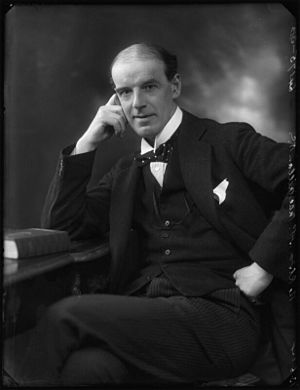Hugh Macmillan, Baron Macmillan facts for kids
Quick facts for kids
The Lord Macmillan
|
|
|---|---|

Macmillan in 1924
|
|
| Lord of Appeal in Ordinary | |
| Minister of Information | |
| In office 1939–1940 |
|
| Lord Advocate | |
| In office 1924–1924 |
|
Hugh Pattison Macmillan, Baron Macmillan (1873 – 1952) was a very important Scottish lawyer and judge. He also worked for the government as a politician and civil servant. He was known for his sharp legal mind and his ability to work with different political groups.
Contents
Early Life and Education
Hugh Macmillan was born in Glasgow, Scotland, on February 20, 1873. His father, the Reverend Hugh Macmillan, was a minister. When Hugh was five years old, his family moved to Greenock.
He went to school in Greenock and later studied at the University of Edinburgh and the University of Glasgow. He was very good at his studies, especially in philosophy and law. He worked hard and became a lawyer in 1897. By 1912, he was a King's Counsel, which means he was a very senior and respected lawyer.
Working for the Government
During the First World War, Hugh Macmillan helped the government. He worked for the Ministry of Information, which was in charge of sharing important news and messages during the war.
In 1924, something unusual happened. The Labour Party formed the government for the first time, led by Ramsay MacDonald. They needed a top lawyer in Scotland, called the Lord Advocate. Even though Macmillan was a Conservative, he was so respected that the Labour government asked him to take the job. He served as Lord Advocate for most of 1924.
A Top Judge in the House of Lords
In 1930, Hugh Macmillan was given a very special job. He became a Lord of Appeal in Ordinary, which is a judge who works in the House of Lords. This is part of the UK's highest court. He was also made a life peer, which meant he became Baron Macmillan of Aberfeldy. This was a rare honor, as he went straight from being a lawyer to being a judge in the House of Lords.
He served as a judge there until 1947. During this time, he wrote many important legal decisions.
Minister of Information During World War II
When the Second World War started in 1939, Macmillan briefly left his judge role to become the Minister of Information again. However, he faced some challenges in this role and was soon replaced. The main building for the Ministry of Information was the Senate House in London. A hall there, the Macmillan Hall, is named after him.
Other Important Roles
Hugh Macmillan held many other important positions throughout his life:
- He led a committee in 1929 that looked into finance and industry. This group is often called the Macmillan Committee.
- He chaired a similar committee in Canada in 1933, focusing on banking and currency.
- He was in charge of the Court of the University of London for many years.
- He also led the BBC Advisory Council, which gave advice to the British Broadcasting Corporation.
- He helped create the National Library of Scotland. He led a committee that worked for ten years to make this happen. A generous businessman, Alexander Grant, donated a lot of money to help set it up.
Honors and Awards
Macmillan received many honors for his work. He became a Privy Counsellor in 1924. He was also awarded the GCVO in 1937, which is a special honor given by the King or Queen.
He received honorary degrees from many universities, including his old schools, the University of Edinburgh and the University of Glasgow. He also received degrees from universities in North America, like McGill University and Columbia University.
Family Life
Hugh Macmillan married his childhood sweetheart, Elizabeth Katherine Grace Marshall, on July 27, 1901.
Legacy
Hugh Macmillan's important papers and documents are kept at the British Library. These papers help people learn more about his life and his contributions to law and government.
Images for kids
 | Misty Copeland |
 | Raven Wilkinson |
 | Debra Austin |
 | Aesha Ash |


